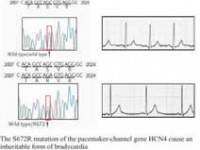
Cardiac pathologies associated with rhythm disorders represent one of the major causes of morbidity and mortality in western countries. In the last few years, molecular approaches to cardiovascular research have identified many genetic defects leading to alterations of the cardiac function. Recent work from our group has identified a mutation (S672R) in the hHCN4 gene, a human isoform of the pacemaker channel gene, which is responsible for a familial form of bradycardia (Milanesi et al., 2006). The search is now being extended to potential new mutations of hHCN4 in patients with familial forms of inherited, symptomatic cardiac diseases affecting sinoatrial pacemaker activity. Genomic DNA is extracted from patients and control individuals and the hHCN4 gene amplified by PCR. DNA fragments are analyzed by SSCP, a technique which allows to identify single-nucleotide mutations and/or polymorphisms in a sequence. Once the genetic analysis is completed (familial origin, linkage analysis and so on) the mutation under investigation is expressed in an in vitro system (cells HEK 293) to allow for functional analysis by patch-clamp and immunofluorescence experiments.


